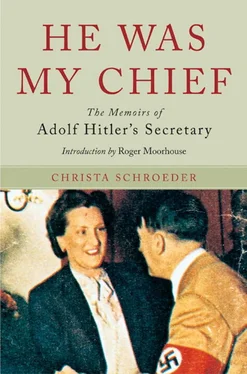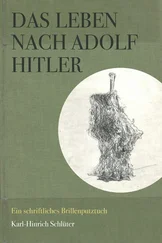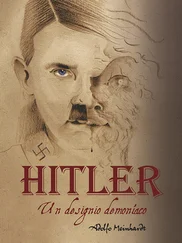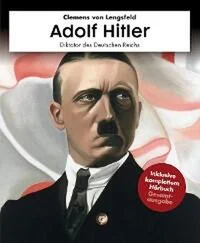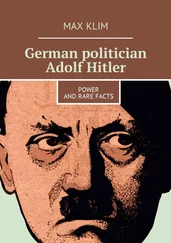Christa Schroeder - He Was My Chief - The Memoirs of Adolf Hitler's Secretary
Здесь есть возможность читать онлайн «Christa Schroeder - He Was My Chief - The Memoirs of Adolf Hitler's Secretary» весь текст электронной книги совершенно бесплатно (целиком полную версию без сокращений). В некоторых случаях можно слушать аудио, скачать через торрент в формате fb2 и присутствует краткое содержание. Город: Barnsley, Год выпуска: 2012, ISBN: 2012, Издательство: Frontline Books, Жанр: История, Биографии и Мемуары, на английском языке. Описание произведения, (предисловие) а так же отзывы посетителей доступны на портале библиотеки ЛибКат.
- Название:He Was My Chief: The Memoirs of Adolf Hitler's Secretary
- Автор:
- Издательство:Frontline Books
- Жанр:
- Год:2012
- Город:Barnsley
- ISBN:978-1-7830-3064-4
- Рейтинг книги:4 / 5. Голосов: 1
-
Избранное:Добавить в избранное
- Отзывы:
-
Ваша оценка:
- 80
- 1
- 2
- 3
- 4
- 5
He Was My Chief: The Memoirs of Adolf Hitler's Secretary: краткое содержание, описание и аннотация
Предлагаем к чтению аннотацию, описание, краткое содержание или предисловие (зависит от того, что написал сам автор книги «He Was My Chief: The Memoirs of Adolf Hitler's Secretary»). Если вы не нашли необходимую информацию о книге — напишите в комментариях, мы постараемся отыскать её.
He Was My Chief: The Memoirs of Adolf Hitler's Secretary — читать онлайн бесплатно полную книгу (весь текст) целиком
Ниже представлен текст книги, разбитый по страницам. Система сохранения места последней прочитанной страницы, позволяет с удобством читать онлайн бесплатно книгу «He Was My Chief: The Memoirs of Adolf Hitler's Secretary», без необходимости каждый раз заново искать на чём Вы остановились. Поставьте закладку, и сможете в любой момент перейти на страницу, на которой закончили чтение.
Интервал:
Закладка:
Hitler spoke a lot of the journeys he made in the years of struggle. In the summer they always drove in the open Mercedes, Hitler seated beside chauffeur Julius Schreck, who died in 1936. Schreck was succeeded by Erich Kempka. They would often stop for a rest at Lambach on the Chiemsee. Hitler was very fond of Lambach; [42] August Kubizek, Adolf Hitler◦– Mein Jugendfreund , Leopold Stocker Verlag, unabridged impression and reprint 2002, pp.55◦– 6; Hitler attended school at Lambach in 1895 and 1896◦– 8, when he also sang as a chorister at Lambach monastery. (TN)
he had been there when Hindenburg’s invitation reached him in 1932, summoning him to Berlin. Hitler related how difficult it was on these journeys to remain anonymous. When Schaub reminded him of the Hotel Elephant at Weimar, Hitler went on:
I had a permanent room there with running water but no bath, and the bathroom was at the other end of the corridor. Every time I was forced to run the gauntlet, for whenever I left my room the word got round like wildfire through the entire hotel and by the time I left the WC, the corridor would have filled with people, and with raised arms and an embarrassed smile I would be manhandled hither and thither all the way back to my room.
He described the games they played to pass the time on the drives, for example ‘Dr Steinschneider’. There were no fixed rules, and one did not realise it was a game until one had lost. Somebody would tell a story so convincingly that the listeners were forced to ask at the end: ‘Who was with them?’ If the answer was ‘Dr Steinschneider’, everybody realised it was a hoax and the questioners had been caught out. Another game was ‘The Beaver’. A ‘beaver’ was a man wearing a full beard, and if one was spotted on the journey you had to shout ‘Beaver!”, and the first to do so won a point. This kind of game would always put Hitler in the best of humour. Occasionally he would imitate the speech and mannerisms of his old comrades. He was an excellent mimic. A highlight of his repertoire was his imitation of the fast-speaking and repetitive Bavarian publisher Max Amann. From Hitler’s impression one could imagine him shrugging his shoulders and gesticulating furiously with his right hand. The tremendous voice of the partially-deaf printer Adolf Müller was also the subject of Hitler’s mimicry. He also liked to imitate foreign statesmen. He could copy exactly the sharp laugh of King Victor Emmanuel of Italy, and showed very skilfully how the king, who appeared gigantic when seated, could stand up and appear to be of normal size.
In this prewar period Hitler could be merry and humorous and knew the value of humour: ‘A humorous word in a difficult situation has often worked wonders’, he said, ‘not only in the First World War, but also in the period of struggle.’ That would not be the case once the first setbacks began in 1941◦– 2, when Hitler became more reclusive and almost inaccessible. He often spoke of the financial bonds in which the Party invested earlier, and were signed by him. Often somebody had to be found at the last moment to redeem them. He liked to quote this example:
I had signed a Loan Note for the Party for 40,000 RM. Money I was expecting had not been received, the Party coffers were empty and the redemption date on the note was coming nearer without any hope of my getting the money together. I was considering shooting myself, since there seemed no alternative. Four days before the redemption date I informed Frau Bruckmann of my unfortunate plight. She phoned Emil Kirdorf [43] Emil Kirdorf (b. 1847, d. 1938). From 1892 Dir-Gen. Gelsenkirchner Bergwerke AG; 1929 guest of honour Nuremberg rally; from 1931 arranged that for every ton of coal sold by Rhine-Westfalen Coal Syndicate, 5 pfennigs would go to the NSDAP.
and sent me to see him. I told Kirdorf of my plans and won him over at once to the cause. He placed the money at my disposal and thus enabled me to liquidate the debt on time.
Hitler also related that at Landsberg prison he either typed parts of the text of Mein Kampf himself or dictated it to Hess. His time there was very strictly scheduled, and he confined his reading matter to history, philosophy and biographies. Whilst in Landsberg he worked on plans for the autobahns and to make available to every citizen a four-seater car for 990 RM. The car was to resemble a May beetle, which already has his garage with it. The ideas for the VW car and the autobahn both occurred to Hitler in 1922 and he said that he had drawn up the plans for both at Landsberg. The highway over the Bavarian Alps was also his idea. This would enable people to experience the beauty of the mountains. The Transalp highway from Lindau to Berchtesgaden was the second point of his programme.
There was really no subject he had not dwelt on: architecture, painting, sculpture, theatre, films, artistry: all were an inexhaustible fund for conversation. If there was a pause in the talk and we were stuck for something to discuss, it was only necessary to mention any of the foregoing and Hitler was in his element. The Church was always a favourite topic. Hitler had no affiliation. He considered the Christian religion to be a hypocritical trap which had outlived its time. His religion was the Law of Nature.
Science has not yet decided from which roots the human race sprang forth. We are probably the highest stage of development from some mammal or other which had developed from the reptile, and then perhaps through the apes to the human being. We are a limb of Creation and children of Nature and the same laws apply to us as they do to all living beings. In Nature, the law of the jungle has been in force from the beginning. All those unsuitable to live, and the weak, are trampled underfoot. Man, and above all the Church, have made it precisely their goal to keep alive by artificial means the weak, those unfit for life and the invalids.
Hitler was clever enough to know that he could not destroy the moral high ground which religious belief provided, and he remained to the end a Catholic, although he intended to renounce membership as soon as the war ended. This act would have a symbolic significance: for Germany the end of an historical epoch and for the Third Reich the beginning of a new era. On the subject of the closing ceremonies at the Nuremberg rallies he once said: ‘The closing Congress must be as solemn and festive as the Catholic mass. The bringing in of the standards, the whole ceremony should be planned like a ritual of the Catholic Church.’ He also planned mass marriages with 50–100 couples. ‘The mass service will make it possible to have very festive ceremonies.’ Great music bands, flower decorations everywhere.
He also spoke of the motherly, self-sacrificing ladies of high society, in whose salons new contacts would be made. He said that it reinforced in him the impression ‘that he was being eyed-up like an ape in a zoo’. One day after the renovation work at the Radziwill Palace, I was called to the Reich Chancellery apartment in the late morning. Hitler was at breakfast with his adjutants in the dining room. I was asked to take a seat at table. Scarcely had I sat than the waiter Karl Krause led in a very young and pretty blonde. This was the baroness Sigrid von Laffert, whose photo at the time was gracing the title page of the Berlin Illustrierte under the heading ‘A German Girl!’ She was the daughter of an officer from Doberan in Mecklenburg, but better known as the niece of Hitler’s patroness Viktoria von Dirksen. David Irving related the following anecdote about her in his very superficial analysis How Sick was Hitler Really? : [44] Wilhelm Heyne Verlag, Munich 1980, p. 27.
‘There was for example Viktoria von Dirksen, an ambitious 150 per cent National Socialist who once managed to inveigle a twenty-one-year old relation, pretty as a picture, naked into Hitler’s bed at the Reich Chancellery. Hitler found her there, but did no more than politely request her to dress and leave the room.’ This was a fable, however.
Интервал:
Закладка:
Похожие книги на «He Was My Chief: The Memoirs of Adolf Hitler's Secretary»
Представляем Вашему вниманию похожие книги на «He Was My Chief: The Memoirs of Adolf Hitler's Secretary» списком для выбора. Мы отобрали схожую по названию и смыслу литературу в надежде предоставить читателям больше вариантов отыскать новые, интересные, ещё непрочитанные произведения.
Обсуждение, отзывы о книге «He Was My Chief: The Memoirs of Adolf Hitler's Secretary» и просто собственные мнения читателей. Оставьте ваши комментарии, напишите, что Вы думаете о произведении, его смысле или главных героях. Укажите что конкретно понравилось, а что нет, и почему Вы так считаете.
